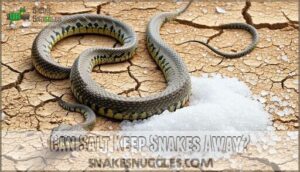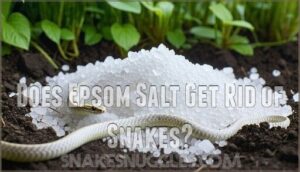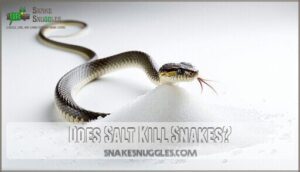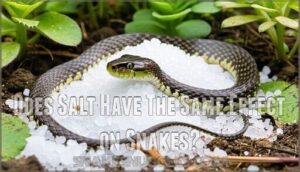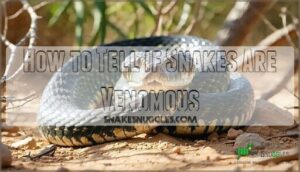This site is supported by our readers. We may earn a commission, at no cost to you, if you purchase through links.
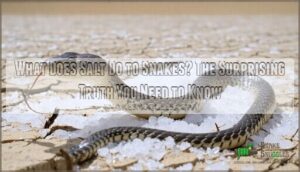
Salt doesn’t act like some magical snake force field – instead, it can actually harm these creatures through dehydration. When snakes contact salt directly, it draws moisture from their skin through osmosis, potentially causing irritation and tissue damage.
Think of it like putting salt on a slug, but less dramatic. Most snakes will avoid heavily salted areas because the terrain becomes uncomfortable, not because they instinctively fear salt.
This doesn’t make salt an effective deterrent though, since rain washes it away and it can harm beneficial wildlife too. Better solutions exist for keeping snakes at bay.
Table Of Contents
- Key Takeaways
- What Does Salt Do to Snakes?
- Can Salt Keep Snakes Away?
- What Smell Do Snakes Hate?
- What Kills Snakes Naturally?
- Does Epsom Salt Get Rid of Snakes?
- Does Salt Kill Snakes?
- Does Salt Kill You?
- Does Salt Have The Same Effect on Snakes?
- Do Snakes Eat Salt?
- How to Identify Common Types of Snakes
- Why Do I Have Snakes?
- Frequently Asked Questions (FAQs)
- Does salt repel snakes?
- Does salt have the same effect on snakes?
- What does salt do to snails and slugs?
- Does Epsom salt keep snakes from slithering?
- Is salt beneficial for snakes?
- Do snakes eat salt?
- Why do snakes hate salt?
- What kills snakes naturally?
- What do snakes hate most?
- What kind of smell do snakes hate?
- Conclusion
Key Takeaways
- You can’t rely on salt to effectively repel snakes since it doesn’t act like a magical force field – it only causes mild dehydration and discomfort that won’t keep them away from your property.
- You’ll waste your time sprinkling salt around because rain washes it away quickly, and unlike slugs that dissolve from salt contact, snakes have protective scales that prevent harmful absorption.
- You’re better off using strong-smelling deterrents like garlic, clove oil, or cinnamon oil since snakes hate these scents that overwhelm their sensitive Jacobson’s organ and actually affect their behavior.
- You should focus on habitat modification instead – remove food sources like rodents, eliminate shelter spots like debris piles, and seal entry points to make your yard naturally unappealing to snakes.
What Does Salt Do to Snakes?
Despite popular myths, salt doesn’t magically repel snakes or instantly kill them.
When snakes encounter salt, it can cause dehydration and disrupt their electrolyte balance over time.
Salt slowly dehydrates snakes and throws their body chemistry off balance, but don’t expect instant results.
However, this salt toxicity occurs slowly and isn’t practical for snake control.
The salt and snakes myth persists, but snakes’ sensory systems aren’t substantially affected by salt’s presence, making it an unreliable deterrent, due to the fact that the effect of salt is not instantly killing them.
Can Salt Keep Snakes Away?
Hope springs eternal in the context of salt deterrent myths, but science delivers a reality check.
You can’t rely on salt to keep snakes away from your property. Snake sensory perception doesn’t respond to salt like other pests do. Salt’s limited impact on these reptiles makes it an unreliable solution.
Instead, focus on effective snake control through habitat modification. Seal entry points, eliminate food sources like rodents, and maintain clean yards.
Consider proven alternative repellents with strong scents that actually affect snake behavior patterns. Despite claims, salt doesn’t repel snakes effectively.
What Smell Do Snakes Hate?
While salt won’t keep snakes away, understanding their scent preferences can help you choose effective natural repellents. Snakes possess a sophisticated olfactory system and rely heavily on their Jacobson’s organ to navigate their world through chemical signals.
Snakes can detect and analyze scents using their highly developed vomeronasal organs (VNO). Strong odors create aversive odors that make snakes uncomfortable.
Garlic and onions top the list of scents snakes hate – their pungent smell overwhelms snake sensory receptors. Clove oil and cinnamon oil work as powerful snake deterrents, while ammonia’s harsh scent acts as an excellent natural snake repellent.
Lemongrass, with its citrusy aroma, creates natural barriers around your property. Essential oils like peppermint, eucalyptus, and citronella also serve as effective snake repellents.
These scents disrupt their chemosensory system, making treated areas less appealing without causing harm.
What Kills Snakes Naturally?
Mother Nature’s snake-control system includes several natural predators that keep populations balanced.
Birds of prey like hawks and owls attack from above, while kingsnakes exhibit cannibalistic tendencies by eating other snakes. Mammals such as foxes, cats, and guinea hens also hunt snakes effectively.
Habitat modification works too—removing debris piles, standing water, and food sources forces snakes elsewhere.
Plant repellents like marigolds and oil deterrents including cinnamon create unwelcoming environments. You can also explore options for plants for snake control.
Unlike the snakes and salt myth, these proven methods actually work without harmful chemicals.
Does Epsom Salt Get Rid of Snakes?
You’ve probably heard neighbors swear by Epsom salt as a snake repellent, but here’s the reality check you need.
While Epsom salt efficacy remains questionable, this snakes and salt myth persists because of its strong scent that can make your yard less appealing to slithering visitors.
Epsom salt won’t guarantee a snake-free property, but it offers a non-toxic approach worth trying.
For application best practices, sprinkle it around entry points and yard perimeters, reapplying after rain.
The environmental impact stays minimal since it’s naturally occurring magnesium sulfate that won’t harm your plants.
However, pet safety concerns exist – keep Fluffy away from treated areas to prevent stomach upset.
When this salt snake deterrent falls short, consider alternative repellents like cinnamon oil or professional removal services for serious infestations.
Does Salt Kill Snakes?
While Epsom salt might create an uncomfortable environment for snakes, regular table salt won’t kill these reptiles.
Salt myths often claim that salt toxicity causes snake dehydration, but this isn’t scientifically accurate.
Unlike slugs, snakes don’t absorb salt through their skin or experience fatal dehydration from contact.
You might wonder, "does salt kill snakes?" The answer is no.
Snakes’ snake biology includes protective scales that prevent harmful absorption.
A salt snake deterrent approach simply doesn’t work as advertised.
While salt can act as a mild snake irritant, it’s far from lethal.
Instead of relying on ineffective salt solutions, consider proven alternative repellents like cinnamon oil or clove oil.
Professional snake repellent products offer better results than homemade salt barriers.
Focus on habitat modification and removal of food sources for lasting snake management.
Does Salt Kill You?
While salt won’t harm snakes, it can definitely harm you.
Salt toxicity is real and dangerous for humans. Just 2-4 tablespoons consumed rapidly can be a lethal dose for adults, while children face risks with even smaller amounts.
Human salt poisoning causes seizures, brain damage, and death in severe cases.
Your body needs sodium, but too much overwhelms your kidneys and disrupts cellular function. Symptoms include vomiting, confusion, and muscle weakness.
Sodium toxicity occurs when you consume approximately 0.5-1 gram per kilogram of body weight. So while exploring snake myths about salt, remember it’s far more dangerous to you than any snake.
Does Salt Have The Same Effect on Snakes?
You might wonder if salt affects snakes the way it devastates slugs and snails.
Salt works like kryptonite on slugs, but snakes? They’ll slither right past your sodium barriers without missing a beat.
The answer is a resounding no.
Unlike these slimy creatures that literally dissolve when exposed to sodium chloride, snakes have completely different biology.
The salt snake myth persists because people assume all garden pests react similarly to salt.
Snakes lack the moisture-rich, permeable skin that makes salt lethal to mollusks.
They’ll simply slither right over your carefully placed salt barriers without any discomfort.
There’s zero salt sensory impact on these reptiles – no snake salt aversion exists in nature.
While salt won’t harm snakes, it does create salt environmental effects in your garden.
Excessive sodium damages soil and plants over time.
Instead of wasting money on this ineffective snake repellent, consider salt alternative repellents like garlic, sulfur powder, or commercial snake deterrent methods that actually work against these fascinating creatures.
Do Snakes Eat Salt?
Snakes don’t munch on salt like you’d sprinkle it on french fries. Their carnivorous lifestyle revolves around live prey—rodents, birds, and amphibians provide all necessary minerals through natural consumption.
Unlike mammals that actively seek salt licks, snakes meet their mineral requirements through their prey’s tissues.
Here’s what happens when snakes encounter salt:
- Salt toxicity disrupts their delicate osmotic balance, potentially causing dehydration and organ stress
- Salt absorption through their skin or digestive system can overwhelm their physiology
- Snake physiology isn’t equipped to process excess sodium like mammals
This snake myth debunking reveals that salt neither attracts nor effectively repels these creatures. Their snake diet and snake nutrition needs are met entirely through hunting, not mineral consumption. Understanding these facts helps separate fiction from reality in snake management strategies.
How to Identify Common Types of Snakes
You’ll need to know basic snake identification skills to stay safe and make informed decisions about the serpents you encounter in your yard.
Learning to spot key features like body patterns, head shapes, and behavioral cues can help you distinguish between harmless garter snakes and potentially dangerous species—think of it as nature’s version of reading warning labels, which involves recognizing key features.
Common Snake Types and How to Tell Them Apart
Field guides won’t help when you’re face-to-face with a slithering visitor.
Garter Snake ID relies on their signature stripes running lengthwise down small bodies. Rat Snake Traits include larger, robust builds perfect for barn hunting. King Snake Patterns showcase bold, contrasting bands that make them unmistakable.
These physical characteristics and Snake Habitat Clues help distinguish snake species quickly.
Identifying them can be aided by specialized identification tools.
How to Tell if Snakes Are Venomous
Once you’ve spotted different snake types, knowing which ones pack venom becomes your next priority.
Here’s how to spot the dangerous ones:
- Fang Identification: Venomous snakes sport prominent, hollow fangs that fold back when not striking—think nature’s switchblade.
- Pupil Shape: Most venomous species have elliptical, cat-like pupils, while nonvenomous snakes typically show round pupils.
- Head Shape: Venomous snakes often display triangular heads that’s noticeably wider than their necks.
- Warning Behaviors: Watch for defensive postures like coiling, hissing, or hood-raising when threatened.
Consider using tools for venomous snake identification for enhanced safety.
Why Do I Have Snakes?
Now that you can identify different snake species, let’s tackle why they’re visiting your property in the first place.
Understanding habitat attraction helps you address the root cause rather than chase snake myths debunking false home remedies snakes like salt.
Snakes aren’t randomly wandering into your yard—they’re drawn by specific conditions that meet their survival needs:
- Food Sources: Rodents, insects, and small animals create a snake buffet on your property
- Shelter Availability: Wood piles, dense vegetation, and rock formations provide perfect hiding spots
- Water Access: Leaky hoses, birdbaths, and moist areas attract thirsty reptiles
- Breeding Grounds: Undisturbed areas offer safe nesting sites during mating season
Remove these attractions, and you’ll eliminate the need for questionable snake repellents or concerns about snake skin irritation from ineffective treatments.
Frequently Asked Questions (FAQs)
Does salt repel snakes?
Like throwing confetti at a hurricane, salt won’t repel snakes effectively.
You’re better off using strong-smelling deterrents like garlic or clove oil since snakes rely on their sensitive smell sensors for navigation.
Does salt have the same effect on snakes?
No, salt doesn’t have any meaningful effect on snakes.
Research shows salt lacks impact on their sensory systems.
You’re better off using strong-smelling deterrents like garlic, clove oil, or cinnamon instead.
What does salt do to snails and slugs?
Unlike snakes, salt actually works against snails and slugs by dehydrating them.
When you sprinkle salt on these slimy garden pests, it draws moisture from their bodies, causing them to shrivel up.
Does Epsom salt keep snakes from slithering?
Epsom salt’s effectiveness as a snake deterrent is questionable at best.
While its strong scent might create an uninviting environment, you shouldn’t rely on it alone to keep snakes away from your property.
Is salt beneficial for snakes?
Beneficial bounties barely exist when you’re sprinkling salt around snakes.
Research reveals salt doesn’t help these slithering creatures at all—it’s actually useless as a deterrent and won’t improve their health or habitat either.
Do snakes eat salt?
No, snakes don’t eat salt.
They’re carnivores who hunt insects, rodents, birds, and eggs.
You won’t catch them licking salt crystals like deer at a salt lick—they’re too busy tracking down their next meaty meal.
Why do snakes hate salt?
Here’s the straight scoop: snakes don’t actually hate salt. This myth has been debunked by research showing salt has zero impact on snake behavior or their highly developed olfactory systems.
What kills snakes naturally?
Natural predators like hawks, owls, and king snakes effectively control snake populations.
You can also eliminate their food sources by removing rodents, clearing debris, and sealing entry points to make your property less appealing to snakes.
What do snakes hate most?
Like garlic repels vampires in movies, strong odors absolutely disgust snakes.
You’ll find they hate cinnamon oil, clove oil, garlic, and vinegar most.
These scents overwhelm their sensitive Jacobson’s organ, making your yard uninviting.
What kind of smell do snakes hate?
Strong odors like garlic, onion, and clove oil really get under snakes’ scales.
You’ll find cinnamon oil, vinegar, and citronella work too.
Their sensitive Jacobson’s organ can’t handle these pungent scents.
Conclusion
Ready to make informed decisions about snake control? Understanding what does salt do to snakes reveals it’s not the magic solution many believe.
Salt causes dehydration and discomfort rather than creating an impenetrable barrier. It washes away easily and can harm beneficial wildlife.
Instead of relying on salt, focus on habitat modification, proper landscaping, and professional removal when necessary.
Remember, most snakes are harmless and actually help control rodent populations around your property.
- https://zoonerdy.com/do-snakes-live-or-go-into-saltwater/
- https://www.thisoldhouse.com/pest-control/reviews/how-to-get-rid-of-snakes
- https://www.animalfoodplanet.com/what-does-salt-do-to-snakes/
- https://www.sciencedirect.com/topics/agricultural-and-biological-sciences/serpentes
- https://www.fs.usda.gov/visit/know-before-you-go/snakes

